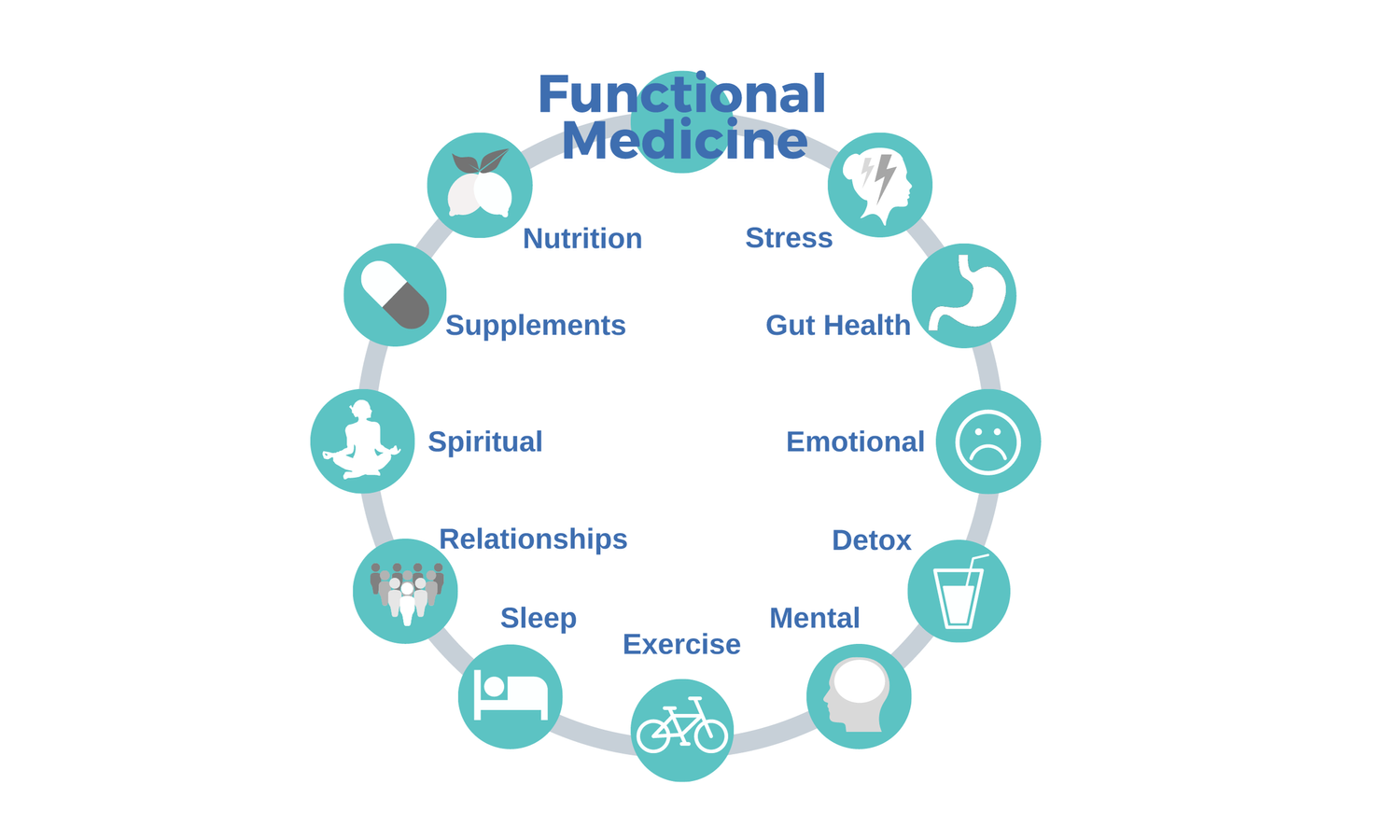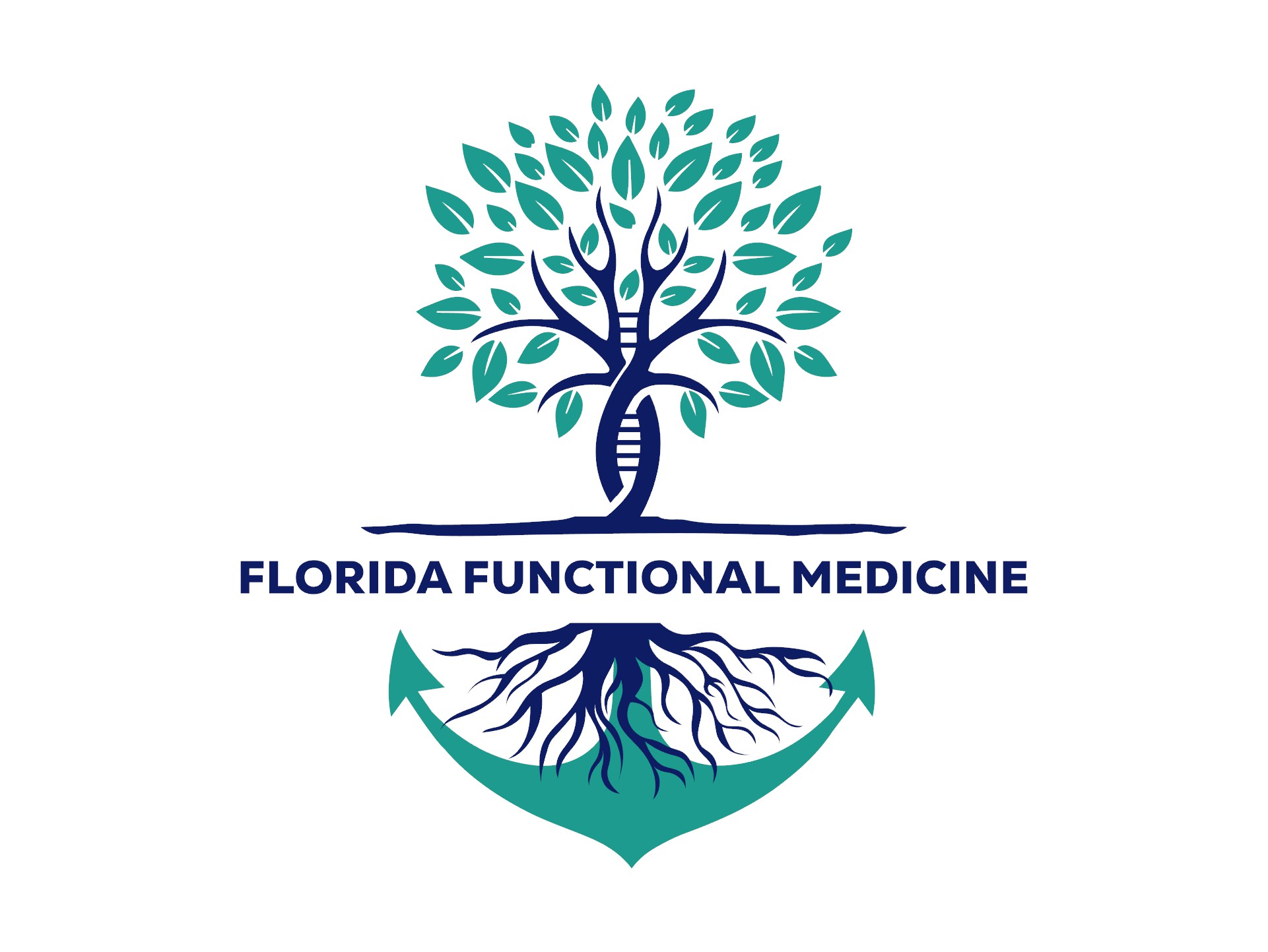
Reclaim your health from the ground up with Functional Medicine.
Your personalized pathway to wellness that honors your unique journey to vibrant health.
Revitalize your health
from the inside out with our
Functional Medicine approach
Restore your function and unlock your body's full potential
with your personalized path to wellness.
Discover the Power of Functional Wellness
It's Time to Heal &
Transform Your Life
True healing starts where chaos begins—deep in the gut.
But that’s just the beginning.
We help you uncover the real reasons behind your symptoms—whether it’s stubborn weight gain, hormone imbalance, fatigue, food sensitivities, brain fog, or “normal” labs that don’t match how you feel.
Rooted in functional medicine, our approach connects the dots between gut health, blood sugar, liver function, inflammation, mood, and more—so you’re no longer chasing surface-level fixes.
We decode the chaos in your labs, your symptoms, and your story—so you can finally experience clarity, energy, and lasting results.
IF YOU ARE SUFFERING FROM:
POOR DIGESTION
WEIGHT GAIN
BAD BOWELS
SUGAR CRAVINGS
BRAIN FOG
SWELLING
SKIN RASHES
FATIGUE
SLEEP ISSUES AND MORE...
It's time to DECODE your SYMPTOMS!
Restoring proper health doesn't have to be hard.
Introducing The Anchored Healing System
Our signature program is designed and personalized for your unique needs.
The virtual consultation, will include a thorough review of your health history, development of a strategic plan to get you started right away with recommendations for nutrition, lifestyle, possibly further lab evaluation and supplements.
Your education and coaching will begin with your unique and personalized program.
Let’s work on your gut chaos together and restore your health for good.
How It Works:
1. Discover
During the discovery phase, we conduct a thorough analysis of your overall health from head to toe, along with specialized laboratory testing. We meticulously explore biochemical patterns and environmental factors to uncover any potential threats to your well-being, leaving no aspect of your health unexamined.
2. Heal
Through personalized treatment plans tailored to your specific needs, we aim to alleviate symptoms, promote tissue repair, and restore optimal function. Our integrative approach combines evidence-based interventions, including nutrition, supplementation, lifestyle modifications, and targeted therapies, to expedite the healing journey.
3. Optimize
When we remove the barriers that are preventing the body from healing we can see amazing changes. By paying close attention to the shifts we are able to support the system in its healing process. By optimizing and making adjustments we can ensure the body has what it needs to begin to restore health.
4. Maintain
Being healthy involves resilience and the capacity to cope with life's challenges. The thriving stage of treatment is when you acquire the skills to sustain well-being amidst the demands of family, work, and other life commitments. When you feel internally balanced, you can engage with life more energetically, vibrantly, and compassionately.

Why Functional Medicine?
Functional Medicine is personally tailored for each person with a scientific based approach to healthcare. This allows us to focus on the mystifying disease and illness by uncovering the fundamental root causes.
Imagine it has a journey piecing together clues your body provides and systematically peeling away layers like an onion to guide you toward optimal health.
Hi there!
I'm Cari
Cari Caraway, MSN FNP-C is a dedicated and experienced practitioner in functional medicine.
With a focus on identifying root causes of health issues,
Cari is committed to restoring well-being and providing compassionate care. Trust in Cari for comprehensive health solutions that prioritize your individual journey to optimal wellness.

Begin your journey towards renewed health and vitality today.

Book Your Free
Chaos Decoder Consult

Let Us Create
Your Personalized Plan

Look Forward
to Better Health and Viality
If you're feeling stretched for time, energy, or finances to invest in your health presently, consider the potential consequences of neglecting it. Prevent the long-term costs of burnout and depletion that poor health may entail.
Patient Experiences
Sarah T.

Florida Functional Medicine transformed my understanding of gut health. Their Taylor program not only addressed my gut issues, but also improved my overall well-being. The virtual consultation was comprehensive, and I left with a clear plan that kickstart my journey to better health.
Francesca P.

I’m amazed by the personalized approach at Florida functional medicine. From virtual consultation to the personalized program, every step was focused on my unique needs. Their expertise in gut health and holistic wellness truly shines through their thorough assessments and strategic plans.
Vivian H.

Florida Functional Medicine goes beyond just addressing symptoms, they tackled the root cause of health issues. Their program gave me invaluable insights into my gut health and its impact on my entire body. The education and coaching provided me with the tools to make lasting changes for a healthier future.
Frequently Asked Questions
What is Functional Medicine?
Functional medicine is a personalized, patient-centered approach to healthcare that focuses on identifying and addressing the root causes of illness or imbalance in the body. It considers the complex interactions between genetics, environment, and lifestyle factors to optimize health and prevent disease.
How is Functional Medicine Different from Conventional Medicine?
Unlike conventional medicine, which often treats symptoms with medications or surgeries, functional medicine seeks to understand and address the underlying factors contributing to health issues. It emphasizes a holistic approach, aiming to promote wellness rather than just managing disease.
What Conditions Can Functional Medicine Treat?
Functional medicine can address a wide range of acute and chronic health conditions, including digestive disorders, hormonal imbalances, autoimmune diseases, metabolic issues, chronic fatigue, and more. It's particularly effective for conditions with complex underlying causes.
What Can I Expect During a Functional Medicine Consultation?
During a functional medicine consultation, you can expect a comprehensive assessment of your health history, symptoms, lifestyle factors, and environmental influences. Your practitioner will work with you to develop a personalized treatment plan focused on addressing the root causes of your health concerns.
What Treatment Modalities Does Functional Medicine Use?
Functional medicine incorporates a variety of treatment modalities, including nutritional therapy, lifestyle modifications, stress management techniques, targeted supplementation, detoxification protocols, and mind-body therapies. The approach is highly individualized based on each patient's unique needs.
How Long Does it Take to See Results with Functional Medicine?
The timeline for seeing results with functional medicine varies depending on the complexity of your health issues, your adherence to the treatment plan, and other factors. While some patients experience improvements in symptoms relatively quickly, achieving long-term wellness often requires ongoing commitment and patience.
Check Out Our Gut Healing Resources

Healthy Food and Lifestyle Swaps to Prevent Bloating
Bloating is a very common condition that most people experience at some point. When you’re bloated, your stomach feels tight, full, and sometimes painful.
Often, we feel bloated after a large meal, and the discomfort is only short-term. Other times, bloating is related to an underlying health condition, and can cause severe symptoms that negatively affect quality of life.
Keep reading to find out more about bloating, its common causes, and how you can prevent it.
What Is Bloating?
Bloating refers to an excess of gas in the gut. Gasses such as oxygen, CO2, methane, and nitrogen enter the gut as you swallow air, and through the fermentation of foods in your large intestine.
A number of factors can cause increased gas in the gut.
Constipation. This is one of the most common causes of bloating. The longer the stool sits in the colon, the more time it has to ferment, resulting in more gas.
Food intolerances. Certain foods, such as lactose or gluten intolerance can cause gas and bloating.
Volume of food. Eating too much or eating too quickly can also cause uncomfortable gas and bloating.
Foods high in fat. Fatty foods are often high in sodium resulting in gas and bloating.
Poor gut health. Imbalances of the gut microbiome, aka the ecosystem of bacteria that lives in your gut.
Physical and mental factors. Stress, anxiety, weight gain, and changes during the menstrual cycle can also alter gut health and cause gas and bloating.
In some cases, bloating is caused by severe medical issues like infection, bowel obstruction, liver disease, or cancer. If you are experiencing chronic and painful bloating, it is important to identify the underlying cause with a medical expert.
How Can You Prevent Bloating?
1 - Avoid foods that cause bloating
Bloating treatment typically begins with changing your diet. Limiting foods that trigger bloating is essential. Certain foods contain high amounts of non- or poorly digestible compounds that lead to increased gas. These foods include:
Beans and lentils. Swap these for grains, meats, or quinoa. If you are going to eat beans, try soaking them or choosing easier-to-digest varieties such as pinto or black beans.
Carbonated drinks. Instead, choose flat water or herbal tea to avoid gas.
Wheat. This can be tricky to avoid, but you can incorporate several gluten-free alternatives into your diet, such as pure oats, quinoa, buckwheat, almond flour, and coconut flour.
Broccoli and cruciferous vegetables like cauliflower and brussel sprouts. While nutritious, these can trigger bloating for some. Instead, consume more spinach, sweet potato, and water-based vegetables like cucumber.
Onions and garlic. To avoid excess gas, add flavor to your food with fresh herbs, or the green parts of scallions and chives.
Dairy. If your bloating is caused by lactose intolerance, swap for lactose-free products such as coconut, almond, or cashew milk.
Sugar alcohols. Xylitol, sorbitol, and mannitol are all heavily associated with excess gas. Swap for sweeteners that are easier to digest, such as stevia, monk fruit, or honey.
Avoid salty foods too often. High sodium intake has also been found to lead to water retention and the gut and bloated sensations.
Reduce consumption of fatty foods. High amounts of fat in the intestine also retain gas, leading to bloating. This is why you may feel bloated and uncomfortable after a fatty meal. These include fried foods, fast food, chips, chocolate, and pastries.
2 - Anti-bloating lifestyle changes
Lifestyle changes to prevent bloating also include eating foods that support regular bowels and prevent constipation. To reduce constipation, increase fiber consumption. Fruits, vegetables, nuts, and seeds are all high in fiber and will help to keep things moving.
As well, be sure to drink adequate fluids. This looks like about 2 liters of water a day.
It should be noted that adding fiber to your diet too quickly may worsen constipation at first, so add it gradually.
It’s also important to exercise regularly. Whether it’s walking, cycling, swimming, or jogging, try spending at least 30 minutes a day moving to maintain healthy bowels.
3 - Support your gut microbiome
Probiotics are live microorganisms that provide health benefits and can help promote healthy levels of bacteria in the gut. Although more studies are needed, some research suggests probiotic consumption can reduce bloating.
You can take probiotics in pill form, or consume probiotic-rich foods such as yogurt, kefir, sauerkraut, kimchi, and miso. If you try supplementing with probiotics, stick with a strain for at least 4 weeks to discern whether it has a beneficial effect on you.
It should also be noted that probiotics are not always recommended for bloating, like in cases of small intestinal bacterial overgrowth (SIBO) for example. Working together with a qualified healthcare practitioner is recommended to avoid making matters worse - we/I can help!
4 - Eat smaller portions more mindfully
Eating large volumes of food in a short amount of time is almost sure to leave you feeling bloated. Your stomach becomes stretched, leading to the pooling of gasses and solids inside the gut. Eating too quickly also can cause you to swallow too much air and is a possible cause of bloating. Furthermore, if the foods contain poorly digested carbs, your body will produce more gas.
Instead, focus on eating mindfully and enjoying every mouthful. Paying attention to our hunger and fullness cues is the first step in mindful eating. Slow down, place your fork down in between bites and chew thoroughly. Avoid eating whilst distracted such as scrolling on your phone or watching TV to prevent overeating.
5 - Keep a food journal
As you can see, a wide variety of foods can influence bloating. Stop guessing and start journaling! Keeping a detailed food journal can help you determine which foods are triggers for you. After a few weeks of logging what you eat and drink, you may be able to pinpoint what exactly causes uncomfortable bloating.
Be sure to also note things like any stressors (work load, family troubles, etc.) you’re experiencing in the journal since stress can be a major contributor.
6 - Get tested for GI issues
If bloating is more than a rare occurrence for you, getting proper GI testing is necessary. As mentioned earlier, these natural treatments and lifestyle changes may not suit everyone. A common symptom of bloating could be a larger issue in your intestines such as leaky gut, SIBO, IBS, IBD, and parasites
Functional stool testing can determine what is really going on and can help to formulate a proper treatment plan. Your natural health practitioner can then help address underlying causes and steer you in the right direction.
There are many steps you can take to reduce the discomfort of bloating. Taking a mindful approach to diet and lifestyle is a great first step. But if your bloating persists for over a week and is consistently painful, talk with us - a qualified practitioner will help get you the proper testing necessary to further identify the root cause and get you bloat free for good!
Sources
Niu HL, Xiao JY. The efficacy and safety of probiotics in patients with irritable bowel syndrome: Evidence based on 35 randomized controlled trials. Int J Surg. 2020 Mar;75:116-127. doi: 10.1016/j.ijsu.2020.01.142. Epub 2020 Jan 31. PMID: 32014597.
Clevers E, Nordqvist A, Törnblom H, Tack J, Masclee A, Keszthelyi D, Van Oudenhove L, Simrén M. Food-symptom diaries can generate personalized lifestyle advice for managing gastrointestinal symptoms: A pilot study. Neurogastroenterol Motil. 2020 Aug;32(8):e13820. doi: 10.1111/nmo.13820. Epub 2020 Feb 7. PMID: 32031756.
Misselwitz B, Butter M, Verbeke K, Fox MR. Update on lactose malabsorption and intolerance: pathogenesis, diagnosis and clinical management. Gut. 2019 Nov;68(11):2080-2091. doi: 10.1136/gutjnl-2019-318404. Epub 2019 Aug 19. PMID: 31427404; PMCID: PMC6839734.
McKenzie YA, Bowyer RK, Leach H, Gulia P, Horobin J, O'Sullivan NA, Pettitt C, Reeves LB, Seamark L, Williams M, Thompson J, Lomer MC; (IBS Dietetic Guideline Review Group on behalf of Gastroenterology Specialist Group of the British Dietetic Association). British Dietetic Association systematic review and evidence-based practice guidelines for the dietary management of irritable bowel syndrome in adults (2016 update). J Hum Nutr Diet. 2016 Oct;29(5):549-75. doi: 10.1111/jhn.12385. Epub 2016 Jun 8. PMID: 27272325.

Contact Us
888-201-8056
Privacy Policy | Terms & Conditions
Copyright 2024 - Florida Functional Medicine